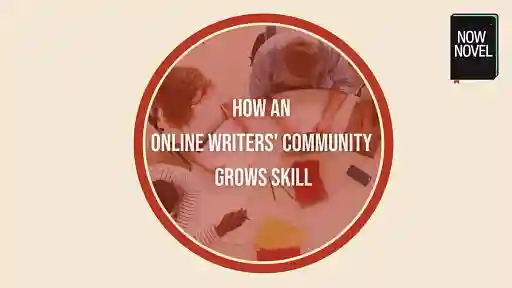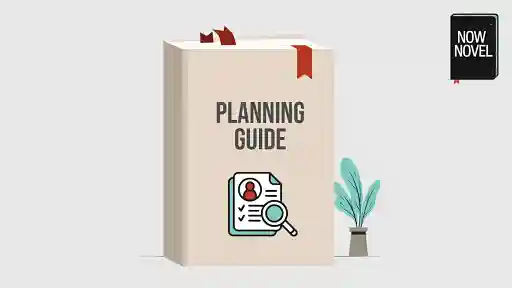This year, we've explored many writing craft and writing process topics on the blog and in our monthly webinars. First, see the most popular articles on the blog this year, then tips from our webinars and good reads from elsewhere:
10 most read articles on Now Novel this year:
1. Dialogue words: Other words for ‘said’ (and what to avoid)
This article has 408 comments and counting, thus it continues to be a popular discussion of when to use 'said' and the pitfalls of using non-standard dialogue tags.
2. 5 ways to start a story: Choosing a bold beginning
Starting is hard. Here we explore ways to begin a book. We added a video to this article this year. Subscribe to Now Novel on YouTube to be first to know when we share new videos in the year ahead.
3. Writing dialogue: 7 examples of dialogues that work
It's finnicky deciding where all those speech marks go, or when to use an action tag. Read 7 examples of effective conversation in stories.
4. What is narrative? 5 narrative types and examples
Narration is an important component of storytelling - the narratorial choices we make, from viewpoint to voice. Read about 5 types of narrative you can use for effect.
5. How to describe clothing in a story (with examples)
Evocative description makes an immersive story. This was another popular read on Now Novel over the past year.
6. How to develop a story: 10 steps to a winning plot
How do you create a memorable plot? With 25,000 shares and counting, this article on plot development continues to be one of the most popular articles among our writing resources.
7. What makes a good story? 10 elements
What makes a good story? Strong dramatic content, varied rhythm and language, believable characters and so much more. Read 10 ingredients of a great story.
8. Story setting ideas: 6 effective setting examples and tips
Setting is another important element for making stories cinematic. Read examples plus tips to make your setting engaging and vivid.
9. Good story openings: 8 lessons from famous first lines
Your first line is the doorway into your story, so think about the design, how it invites your reader to cross the threshold into your world.
Here we dissect 8 famous first lines.
10. Writing tenses: 5 tips for past, present, future
Tense is a tricky area of grammar (with tense drift being one of the most common errors editors observe).
Read tips plus Ursula K. Le Guin's helpful advice on verb tenses.

7 top tips from Now Novel's writing webinars
This year we held many monthly webinars attended by Now Novel members as well as Q&As for our Group Coaching course, launched this year.
Through this, we learned a lot, too - because your questions, thoughts and writing challenges inspire us in turn.
Follow Now Novel on Instagram and Facebook to enter our writing contest - you could win a place on Group Coaching (entries close 3rd January). Previous winner Allorianna says:
The Now Novel writing program is spectacular and provides a wealth of information. I've been reading the Now Novel blogs for several years, and I find them to be well-written and extremely helpful. More recently, as part of a Group Coaching Program, I've been attending their writing webinars and writing sprints. I love Romy! She is a wonderful writing coach. I decided to become a lifetime member because I value the wealth of knowledge they share. P.S. Now Novel's writing dashboard is an amazing, easy-to-use tool!
Allorianna, via TrustSpot
Writing advice from Now Novel's monthly webinars
Read 7 succinct tips Now Novel writing coach Romy Sommer shared in our webinars:
- When starting a new writing project, or getting back into a routine, set SMART goals. SMART writing goals are specific, measurable, attainable, always relevant to your objective, and time-based.
- Think about the broad structure of your story but also the smaller units it is made up of, such as scenes. As Romy says in 'Story Structure', 'If you want to really get that full emotional reaction, and take the reader on this emotional journey, you want to do more than just have an Act 1 and Act 2 and Act 3.'
- Understand the structure and purpose of scenes. They show us sequences of actions and incidents in place and time, and accomplish important objectives such as moving the story forward, or establishing cause and effect.
- Create an action plan for your writing, with flexible dates for key milestones. Romy went into some detail about her own process when planning work on current manuscripts alongside doing promo for past releases.
- Understand different types of characters and the roles they play in a story. A walk-on character, for example, differs from a protagonist in that they do not need a fully developed arc. They may serve a story function specific to a single scene or event (e.g. the town crier announcing an enemy's approach).
- Try different approaches to character creation and inspiration. Romy recommends methods such as answering character questionnaires and creating vision boards. Find what works for you.
- Find internal and external conflict in your story. Conflict drives stories and creates stakes - what characters have to lose if their needs or desires are not met.
Subscribe to a Now Novel plan or join our Group Coaching course for immediate access to our recorded archive plus upcoming live writing webinars where you can ask authors and editors questions.

Writing resources roundup: Best of the web
This year we enjoyed many interesting articles by writers, for writers, and about writing around the web:
On paving the way for others
Joan Didion, the fine American essayist and author, passed away aged 87 on December 23rd, 2021.
Fellow author Zadie Smith wrote a thought-provoking tribute for The New Yorker. In her tribute, Smith describes aspects of Didion's body of work, such as her uncompromising, powerful voice. Says Smith:
When women writers of my generation speak in awed tones of Didion’s “style,” I don’t think it’s the shift dresses or the sunglasses, the cigarettes or commas or even the em dashes that we revere, even though all those things were fabulous. It was the authority. The authority of tone.
Zadie Smith, 'Joan Didion and the Opposite of Magical Thinking', The New Yorker, 24 December 2021.
On fiction and celebrating diverse voices
Nigerian writer Eloghosa Osunde wrote an eloquent piece on time and language for The Paris Review.
There are many powerful statements throughout Osunde's essay, for example:
What does fiction do for me? It allows me to see what has been made, just as it is. It reminds me that if there are seven billion of us, there are seven billion ways to experience the world, seven billion valid iterations.
Eloghosa Osunde, '& Other Stories', The Paris Review, July 22 2021.
On the courage to write and ignoring rules
Another author who left us this year was the gothic author Anne Rice.
Lithub compiled some of Rice's best advice to writers in a tribute. These sage words are from Rice's Facebook page:
Go where the pleasure is in your writing. Go where the pain is. Write the book you would like to read. Write the book you have been trying to find but have not found. But write. And remember, there are no rules for our profession. Ignore rules. Ignore what I say here if it doesn’t help you. Do it your own way.
Anne Rice, via Lithub, '“Never think you’re too weird.” Read Anne Rice’s best writing advice.', December 13 2021.
What were some of your favorite articles or essays on writing you read this year? Share them in the comments.
Join Group Coaching to finish your book with support, accountability and community this coming year.









I'm sure all your articles are well read. I have found value in each article I've read here.
Todd Hicks - Over 3 years ago
Hi Todd, thank you for your kind feedback. I'm glad to hear that!
Jordan - Over 3 years ago